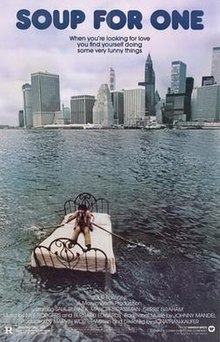|
Soup for One (film)
Soup for One is a 1982 American sex comedy film directed and written by Jonathan Kaufer and produced by Marvin Worth. While the film was a box-office failure (mostly due to mixed reviews over its gratuitous sex scenes, including one involving S&M), it is best remembered for its soundtrack, which was produced by Nile Rodgers and Bernard Edwards of the group Chic, who performed the title track. PlotAllan, a Jewish[1] cable television producer in New York City, is determined to find the perfect woman, and he even goes so far as having a description of what she would look like done on an artist sketch. Before he can encounter the girl of his dreams, he finds himself encountering a series of disastrous dating roadblocks. He finally meets Maria, who seems to be his perfect woman, and tries to make the relationship work. Cast
SoundtrackIn addition to "Soup for One" (Pop #80, R&B #14), Chic performed and produced four other cuts from the soundtrack: "Open Up", "Tavern on the Green", "I Work for a Living", and "Riding". "I Want Your Love" (Pop #7, R&B #5), which also is included, was a 1979 recording. Rodgers and Edwards wrote and produced three songs for the film, one by Teddy Pendergrass ("Dream Girl"; he performs this in a cameo as a night club singer), another by Sister Sledge ("Let's Go on Vacation") and one for Carly Simon ("Why") (UK #10). Debbie Harry contributed a song to the soundtrack, titled "Jump Jump". The album, released on WEA/Mirage Records, was released in 2015 on compact disc. ReceptionThe film opened on April 30, 1982 in New York City, parts of New Jersey, Toronto, and Cincinnati; most of the reviews it received in each market were negative. Ron Base of The Toronto Star likened Rubinek's character to John Hinckley, Jr., who attempted to assassinate then-President Ronald Reagan a year before; he also derided director-writer Kaufer's style of comedy, saying that "his desperation to squeeze out a laugh is unparalleled; one expects him to start shooting dogs in hopes it will draw a chuckle from someone in the audience."[2] Rex Reed described it as "an ethnic creep show that pretends to be a farce about the singles scene in New York City, to no avail. Jonathan Kaufer, the writer-director, doesn't have a clue about how to sustain a coherent plot narrative, and the actors are abysmal." Reed also described Rubinek as "somebody I hope never to encounter again on either a movie screen or the stoop outside Zabar's".[3] Alex Kaneas of Newsday gave the film two stars and wrote that it was a film that "badly wants to make us laugh, so it strains and, losing its tenuous hold on reality, as it often does, ceases to become funny as parody. 'Soup,' now at area theaters, also keeps telling us what's funny instead of allowing us to discover it for ourselves. One shot, for example, of a Greenwich Village theater poster—Joseph Papp Presents 'The Home Life of Leonid Brezhnev'—would have been quite enough. But 'Soup' has to elbow us in the ribs with it." He also noted that "there seems to be, in the Neil Simony broth of 'Soup,' with its shtik and its fatuous characters who seem to have no reason for existence other than to deliver one-liners, a Woody Allen soul struggling for liberation. As it is, though, it's a derivative, less than "meaningful" relationship."[4] Richard Freedman of The Star Ledger called the film "by and large too arch and feebly satiric to make much impact. And Rubinek, who was fine as the hero's comedian pal in 'Ticket to Heaven,' is too concerned with following in the footsteps of Woody Allen and Dudley Moore as an offbeat lover to find a style of his own as effective as theirs."[5] Tom McElfresh of The Cincinnati Enquirer called the film's main character "silly, mawkishly sentimental, Insensitive[,] monumentally boring [and] ludicrous enough to promote yawns and disbelief instead of the intended belly laughs." He also said that "Kaufer's background is all television and it shows. His characters have the cardboard emotions of stock drama and his events the lusterless, ludicrous silliness of sitcoms. On the big screen the lush budget and Fred Schuler's romanticized cinematography of Manhattan demonstrate just how thin the soup is."[6] Vincent Canby wrote a more mildly positive review of the film in The New York Times, which read:
Kathleen Carroll of the New York Daily News gave the film two-and-a-half stars, remarking that it " ouldn't have cost much more than a can of soup, judging from the cheesy photography and the sloppy editing. But for someone who is just getting his feet wet in the movie business, writer-director Jonathan Kaufer displays flashes of wit that make this romantic comedy about the mating game seem quite lovable at times."[8] References
External links
|
||||||||||||||||||||||||||||
